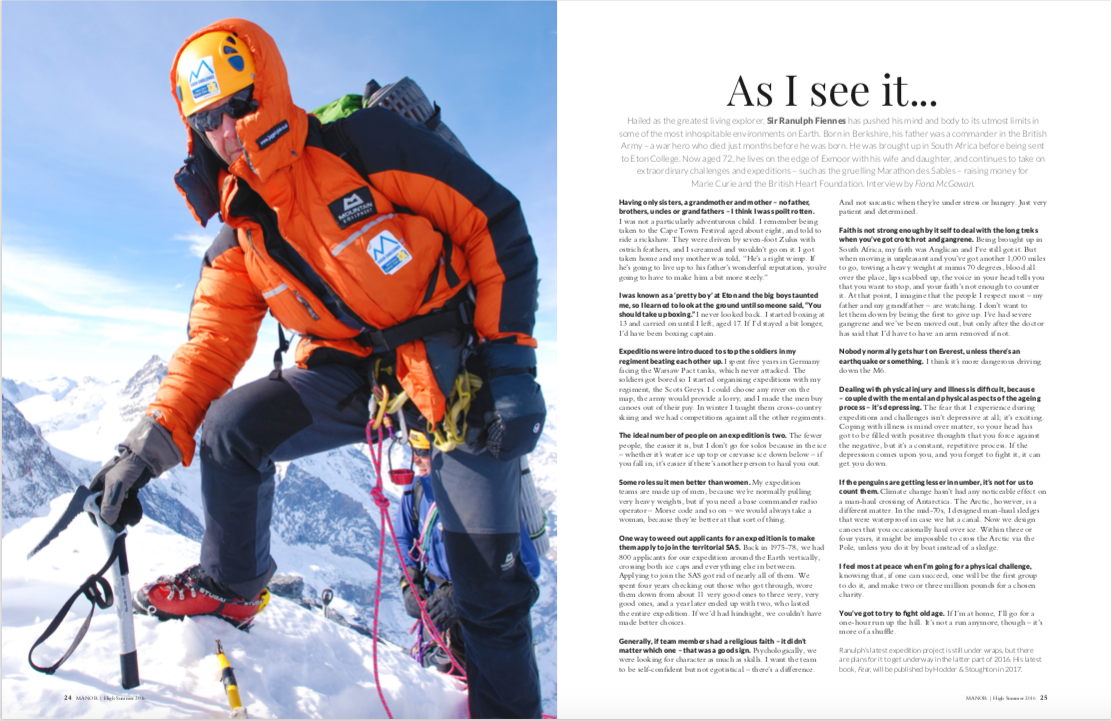Ranulph Fiennes

Having only sisters, a grandmother and mother – no father, brothers, uncles or grandfathers – I think I was spoilt rotten. I was not a particularly adventurous child. I remember being taken to the Cape Town Festival aged about eight, and told to ride a rickshaw. They were driven by seven-foot Zulus with ostrich feathers, and I screamed and wouldn’t go on it. I got taken home and my mother was told, “He’s a right wimp. If he’s going to live up to his father’s wonderful reputation, you’re going to have to make him a bit more steely.”
I was known as a ‘pretty boy’ at Eton and the big boys taunted me, so I learned to look at the ground until someone said, “You should take up boxing.” I never looked back. I started boxing at 13 and carried on until I left, aged 17. If I’d stayed a bit longer, I’d have been boxing captain.
Expeditions were introduced to stop the soldiers in my regiment beating each other up. I spent five years in Germany facing the Warsaw Pact tanks, which never attacked. The soldiers got bored so I started organising expeditions with my regiment, the Scots Greys. I could choose any river on the map, the army would provide a lorry, and I made the men buy canoes out of their pay. In winter I taught them cross-country skiing and we had competitions against all the other regiments.
The ideal number of people on an expedition is two. The fewer people, the easier it is, but I don’t go for solos because in the ice – whether it’s water ice up top or crevasse ice down below – if you fall in, it’s easier if there’s another person to haul you out.
Some roles suit men better than women. My expedition teams are made up of men, because we’re normally pulling very heavy weights, but if you need a base commander radio operator – Morse code and so on – we would always take a woman, because they’re better at that sort of thing.
One way to weed out applicants for an expedition is to make them apply to join the territorial SAS. Back in 1975-78, we had 800 applicants for our expedition around the Earth vertically, crossing both ice caps and everything else in between. Applying to join the SAS got rid of nearly all of them. We spent four years checking out those who got through, wore them down from about 11 very good ones to three very, very good ones, and a year later ended up with two, who lasted the entire expedition. If we’d had hindsight, we couldn’t have made better choices.
Generally, if team members had a religious faith – it didn’t matter which one – that was a good sign. Psychologically, we were looking for character as much as skills. I want the team to be self-confident but not egotistical – there’s a difference. And not sarcastic when they’re under stress or hungry. Just very patient and determined.
Faith is not strong enough by itself to deal with the long treks when you’ve got crotch rot and gangrene. Being brought up in South Africa, my faith was Anglican and I’ve still got it. But when moving is unpleasant and you’ve got another 1,000 miles to go, towing a heavy weight at minus 70 degrees, blood all over the place, lips scabbed up, the voice in your head tells you that you want to stop, and your faith’s not enough to counter it. At that point, I imagine that the people I respect most – my father and my grandfather – are watching. I don’t want to let them down by being the first to give up. I’ve had severe gangrene and we’ve been moved out, but only after the doctor has said that I’d have to have an arm removed if not.
Nobody normally gets hurt on Everest, unless there’s an earthquake or something. I think it’s more dangerous driving down the M6.
Dealing with physical injury and illness is difficult, because – coupled with the mental and physical aspects of the ageing process – it’s depressing. The fear that I experience during expeditions and challenges isn’t depressive at all; it’s exciting. Coping with illness is mind over matter, so your head has got to be filled with positive thoughts that you force against the negative, but it’s a constant, repetitive process. If the depression comes upon you, and you forget to fight it, it can get you down.
If the penguins are getting lesser in number, it’s not for us to count them. Climate change hasn’t had any noticeable effect on a man-haul crossing of Antarctica. The Arctic, however, is a different matter. In the mid-70s, I designed man-haul sledges that were waterproof in case we hit a canal. Now we design canoes that you occasionally haul over ice. Within three or four years, it might be impossible to cross the Arctic via the Pole, unless you do it by boat instead of a sledge.
I feel most at peace when I’m going for a physical challenge, knowing that, if one can succeed, one will be the first group to do it, and make two or three million pounds for a chosen charity.
You’ve got to try to fight old age. If I’m at home, I’ll go for a one-hour run up the hill. It’s not a run any more, though – it’s more of a shuffle.
Ranulph’s latest expedition project is still under wraps, but there are plans for it to get underway in the latter part of 2016. His latest book, Fear, will be published by Hodder & Stoughton in 2017.
